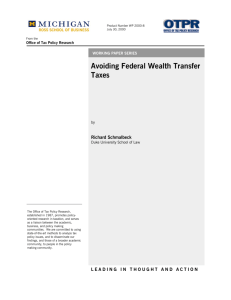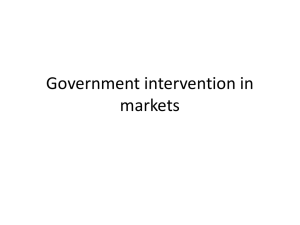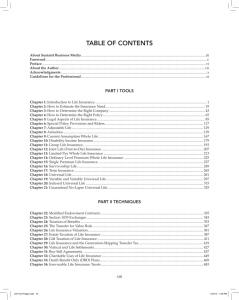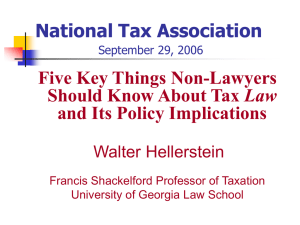Telecommunications & Methods for Avoiding Double Taxation
advertisement
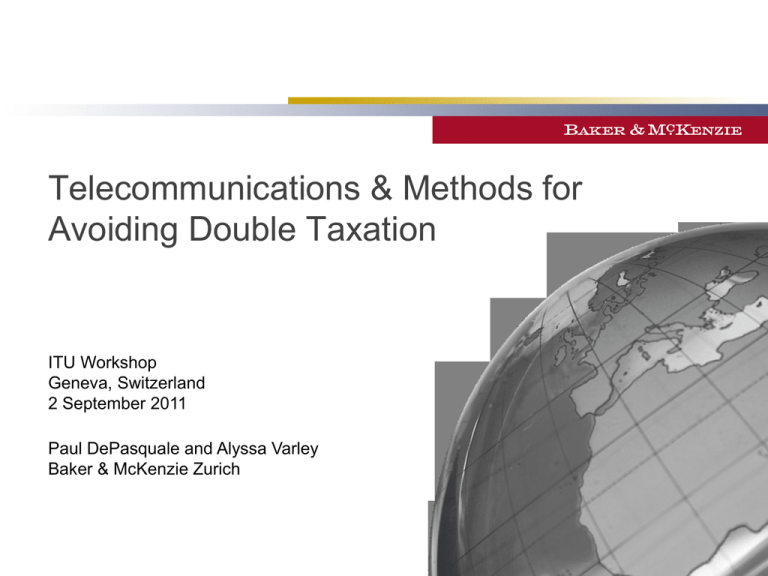
Telecommunications & Methods for Avoiding Double Taxation ITU Workshop Geneva, Switzerland 2 September 2011 Paul DePasquale and Alyssa Varley Baker & McKenzie Zurich ©2011 Baker & McKenzie Zurich Overview 1. The Melbourne Agreement 2. Double Taxation in General 3. Avoiding Double State Taxation in the United States Context 4. Take Aways bakermckenzie.com The Melbourne Agreement [change title in View/Header and Footer] 3 The Melbourne Agreement ● International Telecommunication Regulations, ITRs (commonly referred to as the “Melbourne Agreement”) ● Adopted by the ITU in 1988 at the World Administrative Telegraph and Telephone conference ● Purpose: promote efficient operation and harmonious development of telecommunications across jurisdictions bakermckenzie.com The Melbourne Agreement ● Article 6.1.3 provides that: “Where, in accordance with the national law of a country, a fiscal tax is levied on collection charges for international telecommunication services, this tax shall normally be collected only in respect of international services billed to customers in that country, unless other arrangements are made to meet special circumstances.” bakermckenzie.com The Melbourne Agreement Proposals for Altering 6.1.3 ●Alternative 1 “Countries are free to levy fiscal taxes on international telecommunication services in accordance with their national laws, but international double taxation must be avoided.” ● Alternative 2 “Countries shall not apply taxes to incoming international calls, to avoid double taxation.” bakermckenzie.com Double Taxation in General [change title in View/Header and Footer] 7 Basic Types of Double Taxation ● Economic Double Taxation – Two different persons are subject to tax on the same income or capital ● Juridical Double Taxation – One person is subject to tax on the same income or capital by more than one tax authority – Three possible situations bakermckenzie.com Mechanisms for Avoiding Double Taxation ● Exemption Method – Concept: the residence jurisdiction does not tax income that the source jurisdiction may tax – Types: full exemption and progressive exemption ● Credit Method – Concept: the residence state taxes total worldwide income of a taxpayer resident in that state but will allow a credit for taxes paid to the source state – Types: full credit and ordinary credit bakermckenzie.com Mechanisms for Avoiding Double Taxation Exemption Method Example: Company has $100 of income; $70 from Residence Country and $30 from Source Country. Residence Country tax rate is 40% and Source Country tax rate is 30%. Item Gross Income Source income exemption Residence Taxable income Residence tax rate Residence Tax Source Tax ($30 x 30%) Total taxes paid bakermckenzie.com Exemption No Exemption $100 (30) $70 x 40% $28 $100 (0) $100 x 40% $40 $9 $9 $37 $49 Mechanisms for Avoiding Double Taxation Credit Method Example: Company has $100 of income; $70 from Residence Country and $30 from Source Country. Residence Country tax rate is 40% and Source Country tax rate is 30%. Item Credit No Credit Gross Taxable Income Residence Tax Rate Residence Tax Pre-Credit Source Tax Credit $100 x 40% $40 (9) $100 x 40% $40 (0) Total Residence Tax Due $31 $40 Source Tax ($30 x 30%) $9 $9 $40 $49 Total taxes paid bakermckenzie.com Objectives of a Double Tax Agreement (“DTA”) ● Protect against the risk of double taxation ● Define which taxes are covered ● Provide a procedural framework for enforcement and dispute resolution ● Protect each governments’ taxing right ● Protect against attempts to avoid or evade tax liability bakermckenzie.com Avoiding Double Taxation in the United States Context [change title in View/Header and Footer] 13 Constitutional Federalism in the U.S. ● Dual sovereignty of the Federal and state governments ● The Commerce Clause (Article I, Section 8, Clause 3 of the U.S. Constitution) ● Four-part test of the U.S. Supreme Court to determine the constitutionality of a state or local tax: – Substantial connection with the state – No discrimination against interstate commerce – Tax must be fairly apportioned – Fair relationship between the tax and the services provided bakermckenzie.com The Goldberg Case (Goldberg v. Sweet) ● Background: In 1985, the state of Illinois enacted a 5% tax on the gross charge of interstate telecommunications originating or terminating in Illinois regardless of where the telephone call is billed or paid ● Opinion: The U.S. Supreme Court applied four-part test and held that the Illinois excise tax did not violate the commerce clause because it satisfied the test ● Aftermath: Applying the Goldberg reasoning to wireless telecommunications can lead to double taxation and confusion regarding the need to pinpoint the physical location of origination bakermckenzie.com The Goldberg Case (Goldberg v. Sweet) ● Rule for establishing a “substantial nexus” under Goldberg: (1) the call must (a) originate in the state, or (b) terminate in the state, and (2) the call must be (a) charged to a service address in the state, or (b) billed in the state, or (c) paid for in the state. bakermckenzie.com The Mobile Telecommunications Sourcing Act ● In 2000, the U.S. Congress enacted the Mobile Telecommunications Sourcing Act of 2000 to – Simplify billing statements – Reduce the potential for double taxation – Reduce and simplify the tax rules for both carriers and state and local governments ● Main provision: Sourcing to place of “primary use” bakermckenzie.com Take Aways [change title in View/Header and Footer] 18 Take Aways ● The problem of double taxation ● Functions of treaties ● Basic mechanisms governments use to avoid double taxation ● Avoiding double taxation in the U.S. bakermckenzie.com Pursuant to requirements relating to practice before the Internal Revenue Service, any tax advice in this communication (including any attachments) is not intended to be used, and cannot be used, for the purpose of (i) avoiding penalties imposed under the United States Internal Revenue Code, or (ii) promoting, marketing, or recommending to another person any tax-related matter. Baker & McKenzie International is a Swiss Verein with member law firms around the world. In accordance with the common terminology used in professional service organizations, reference to a “partner” means a person who is a partner, or equivalent, in such a law firm. Similarly, reference to an “office” means an office of any such law firm. bakermckenzie.com
